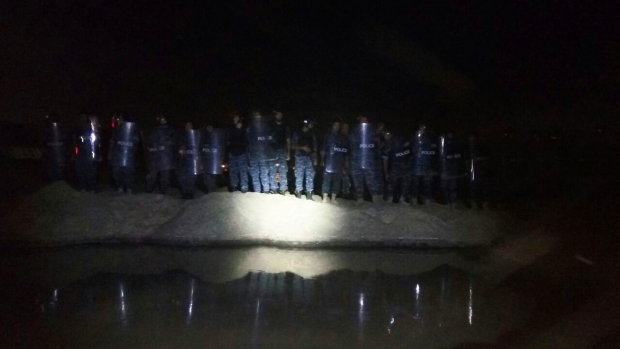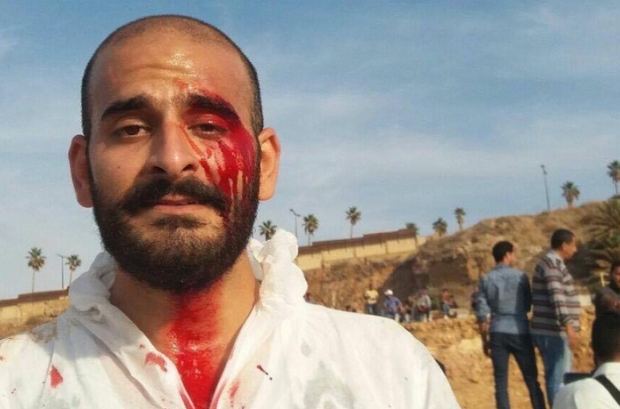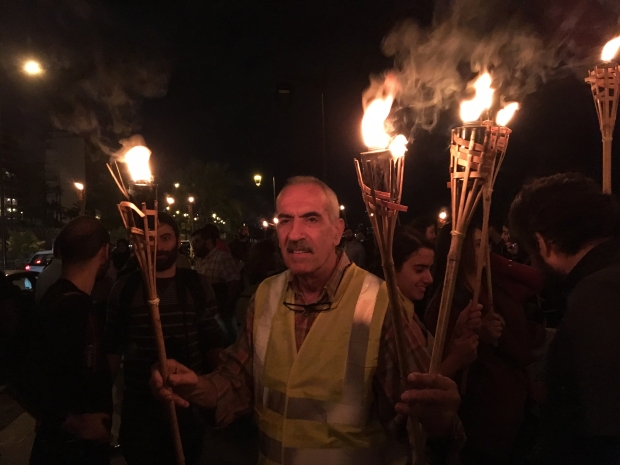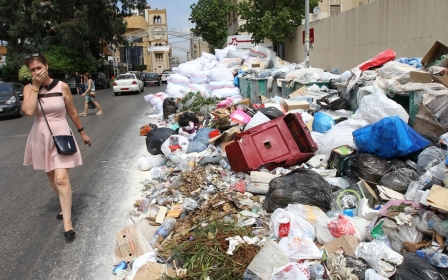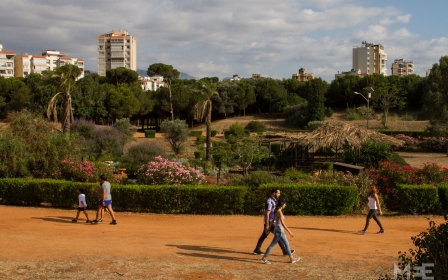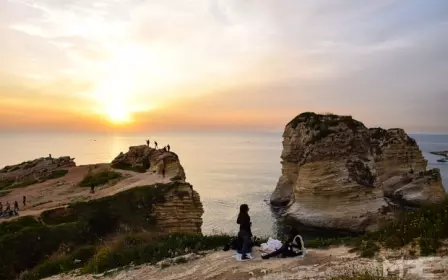The fight to save Beirut’s last public beach – and the struggle to save Lebanon
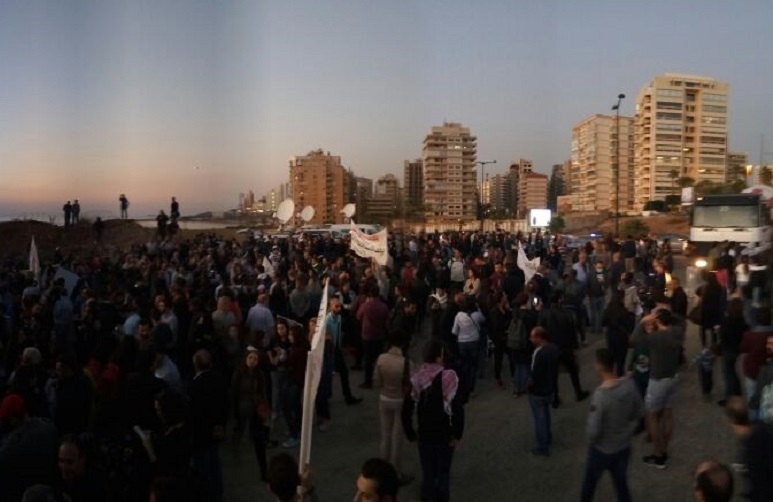
Beirut is on its way to becoming the only city in the entire Mediterranean region without a public beach.
The shores of Ramlet al-Baida, often packed with people during the capital’s hot summers, are slowly being reduced to a series of luxury resorts.
Keep in mind that this is only the latest battle for the few remaining public spaces that locals can access
There are no other options if you want to enjoy yourself for free at the beach. For example, not far from Ramlet al-Baida is the Riviera Hotel and Beach Resort. For adults, entrance fees on weekdays cost a little over $20, rising to $30 on weekends.
The first new private beach being built by Lebanese property developer Achour Development is the Eden Bay Resort. As described on the official website, the resort will take up 5,188 square meters, comprised of luxurious cabins and chalets.
Keep in mind that this is only the latest battle for the few remaining public spaces that locals can access.
Both the rocky outcrop of the Dalieh seafront, and Horsh Beirut, the city’s largest public park, were once places entirely open to the public. However, unless you are a tourist or a political figure, the park is only open for limited morning and weekend hours.
The million-dollar question: public or private property?
But these issues of privatisation and diminishing public spaces were largely ignored in political discourse until the garbage crisis protests shed light on the corruption and problematic aspects of Sukleen, Beirut’s waste collection corporation.
Locals and residents in Lebanon alike will tell you that legal loopholes and grey areas are commonplace, and the debate over the Ramlet al-Baida beach is no exception.“It’s complicated,” says Lebanese architect and urbanist, Abir Saksouk, who vehemently opposes the construction project.
Firstly, the construction is happening on four subdivided plots of land that are part of a larger territory. Two of the four plots that Achour Development is building on were deemed illegal for construction, according to Saksouk.
Illegal construction
Saksouk is also active in the Dalieh campaign and local municipal movement Beirut Madinati’s seafront taskforce, a group that focuses on coastal urban planning issues. She says that building was prohibited in the subdivision contract from 1949 as well as the two plots’ cadastral registers.
The territory is officially legal for the proposed developments, but how this came to pass is murky
That was, before she and other architect and urban planners in the taskforce noticed that these documents had “disappeared". “This is a case of forgery,” she has concluded.
In 1957, notices were put on these four plots of land, stating that they had trespassed on the public maritime domain by “more than 40 percent of their total size”. In other words, building on the plots would be trespassing and therefore illegal.
Thirdly, in 1966, as Beirut’s corniche esplanade was being built, an initial plan to extend the construction towards the currently disputed site was blocked as a result of a zoning law that did not permit the construction between the corniche road and the beach.
However, despite the government tabling the zoning law in 1995 to ease restrictions on real estate companies, Saksouk argues, “the zoning still stipulates that any construction needs to set back from the public domain by 20 meters, rendering these plots unbuildable”.
And finally, as most activists will argue, Lebanon’s 1925 public properties law states that the furthest point of any sandy beach where the waves touch as the tide comes in is public domain.
In short, the territory is officially legal for the proposed developments, but how this came to pass is murky. And there is a much bigger picture to this campaign. According to Saksouk, this is “a battle over legal and urban history, how properties were created, and re-questions our entire property regime”.
Middle East Eye contacted Achour Development for comment on this piece but had not had a response by the time of publication. Previously, however, the company has told MEE that they have the legal documents necessary for the project.
"The project does not impinge on the public beach," a company representative said this month. "We have all the legal documents that prove that we are in our right."
Adding insult to injury
For Lebanon’s wide array of social, economic and political issues, one thing tends to unite the people: a collective sense of humiliation and shame.
Whether it is the fact that Lebanon still can’t provide electricity and water to its homes - let alone pick up and manage its own garbage - or provide adequate public spaces for its people.
The fact that the establishment often responds to these problems with a nonchalant shrug truly feels like a sucker punch to the face - in one case, according to one account, literally.
On 14 November, a dozen activists were making their way to the Ramlet al-Baida building site to halt the construction process when Whard Sleiman, a university student who was among the activists, said he was punched in the face by a man in plain clothing.
“I wanted to calm him down, but before I could say anything, he punched me in the face right after I ran up to him,” Sleiman said.
Beach clashes
The following night, about 150 people took to the construction site at night, carrying torches. This time, there was a trench with sewage water between the site and the rest of the beach, with only a small wooden plank separating the two areas.
The protestors crossed over, and began to remove hoses used for draining water that collects when construction begins and holes are dug. These pools of water can be dangerous, causing building foundations to collapse if left undrained. Riot police sporadically clashed with protestors, injuring one.
According to posts by activists on Facebook, many protestors woke up the following day to calls from the police, saying that Achour Development has sued them for trespassing and damaging their property, though not all the protestors who were called had pulled up the pipes the previous night.
They could face a fine of up to $50,000, a fine that none of them would be able to pay. It would not be far-fetched to assume that this was done to scare away future protestors, and to pressure Sleiman and others to desist from taking further legal action over the assault.
“I did make a formal complaint about the man who punched me, but the police have been stalling and prioritising rounding up activists that were at the protest,” says Sleiman.
Though protests escalated the following weekend, with at least 500 people in attendance including student movements and members of Beirut Madinati, it is only a matter of time to see what will come of this.
- Kareem Chehayeb is a Lebanese writer and musician based in Beirut. He is the co-founder of Beirut Syndrome, a grassroots media platform. You can follow him on Twitter @chehayebk
The views expressed in this article belong to the author and do not necessarily reflect the editorial policy of Middle East Eye.
Photo: Protest at Ramlet al-Baida on 26 November 2016 (MEE/Whard Sleiman)
Middle East Eye propose une couverture et une analyse indépendantes et incomparables du Moyen-Orient, de l’Afrique du Nord et d’autres régions du monde. Pour en savoir plus sur la reprise de ce contenu et les frais qui s’appliquent, veuillez remplir ce formulaire [en anglais]. Pour en savoir plus sur MEE, cliquez ici [en anglais].



